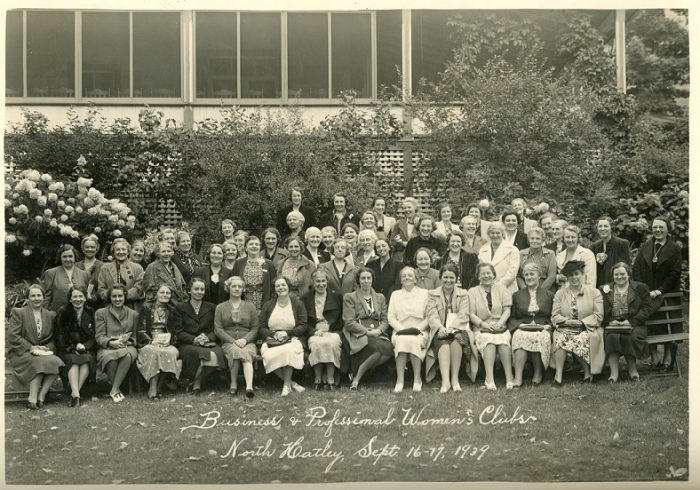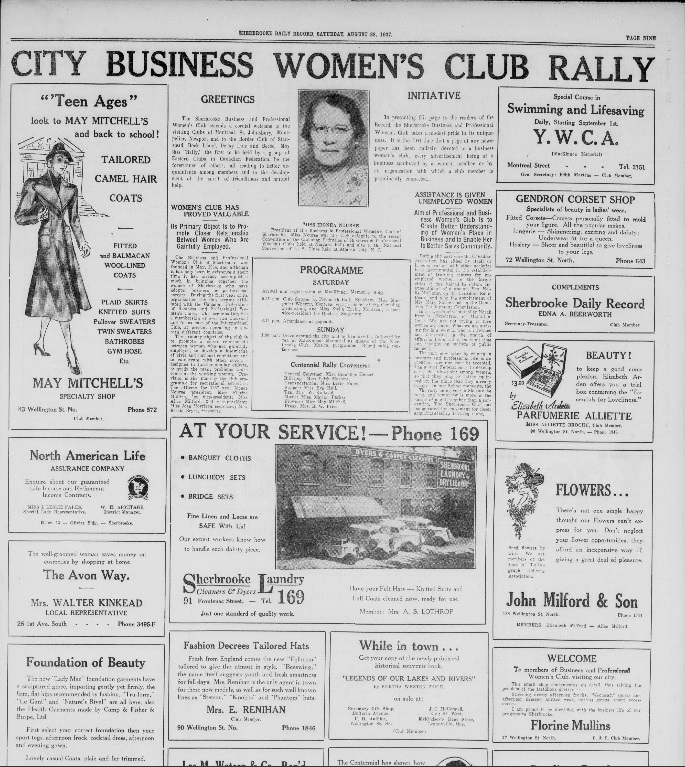

Share
The Business and Professional Women’s Club of Sherbrooke
March 12th, 2019
In 1930, most Canadian women had had the right to vote in federal elections for nine years but it would still be another ten years before they would achieve that right in Quebec provincial elections. This was a period of changing experiences, expectations, and aspirations for many women. A part of this shifting landscape was the entry of more women into the spheres of business, often in the sectors of secretarial work, teaching, and nursing, but also as small business owners.
Locally, in response to the growing growing number of business and professional women, the Young Women’s Christian Association (YWCA) in Sherbrooke started a business and professional women’s supper club in 1930, with its chief purpose being to give the women a place to socialize with others who had similar pursuits and challenges when it came to gainful employment.
By July 1934, a Business and Professional Women’s Club of Sherbrooke was founded with slightly different goals than the club established by the YWCA. With ties to the Canadian Federation of Business and Professional Women’s Clubs, the Sherbrooke Club incorporated broader political questions regarding women’s rights and their place in business in addition to the aim of promoting closer relationships among professional women.
To accomplish their objectives, their meetings were sometimes largely social times, with a meal and entertainment, but other times they hosted special speakers, among which included Nellie McClung in 1939. They also hosted and participated in rallies with clubs from across the province and the country and, in 1945, the Club established a public speaking contest for girls from the Sherbrooke and Lennoxville High Schools.
In researching the history of the Business and Professional Women’s Club, I couldn’t help but start to wonder about the individual women who were members, listed year after year among the reports on their activities; who were they, what did they do for a living, what were their stories?
Unsurprisingly given the general expectation that married women and mothers should be in the home, many of the members were single but there were some married women among their ranks as well. Jean (née Mills) Kinkead, for example, helped operate the tobacco store established by her husband’s family. Eva (née Dupuis) Renihan ran a business making fine hats.
Among the unmarried members was Geraldine Hebert, a prominent Sherbrooke portrait photographer (owner of the Sears Studio) who studied photography in Chicago and New York City. Somewhat ironically, Alice Milford and her sister, Bessie, worked in the family’s florist business, called James Milford & Son. Eventually the business became known simply as “Milford’s”, where Alice continued to work as a florist in Sherbrooke until she retired. In 1937, Leslie Fales was working as the “special lady representative” at an insurance company. And still many others operated shops of various sorts, including ladies fashion, children’s clothing, and hair salons.
After over 30 years of activity, providing support and fostering relationships among the business women of Sherbrooke, the Business and Professional Women’s Club of Sherbrooke likely disbanded in the late 1960s. While a clear reason for the disbandment was not apparent among the documents, it may have been that the principal objectives of the club were no longer tangible to a new generation of women encountering the working sphere in a much different way than those before them.

